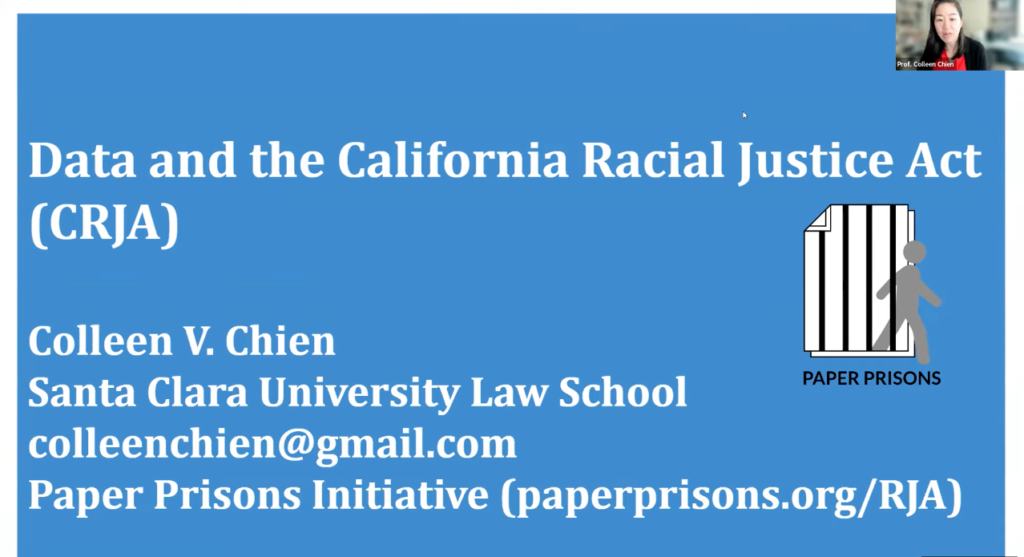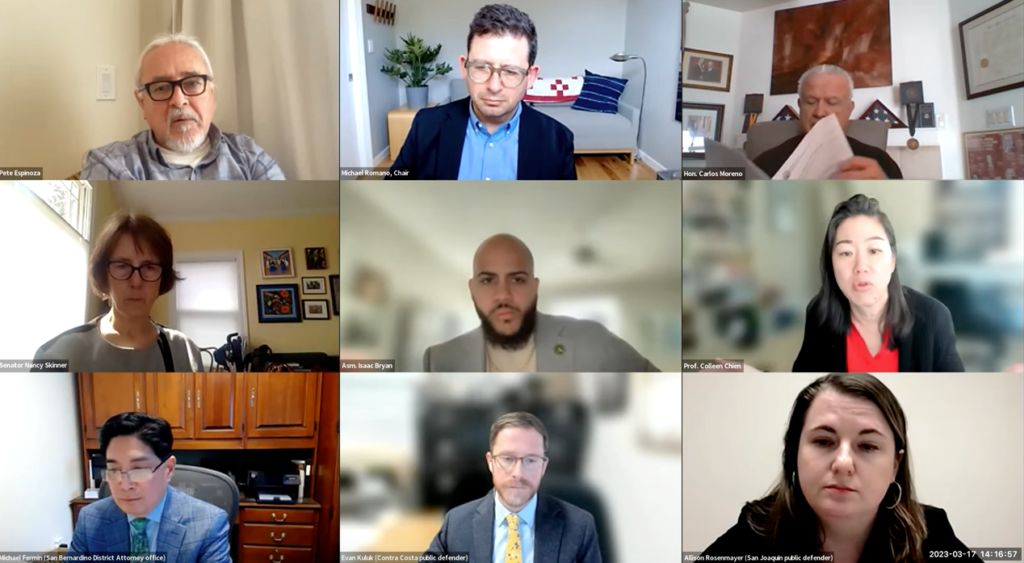On March 27, 2023, the California Committee on the Revision of the Penal Code held a hearing on the California Racial Justice Act (CRJA) (recording here*, RJA portion starts at 52:02). Paper Prisons founder, Professor Colleen Chien testified before the committee about the data infrastructure supporting implementation of the CRJA , alongside Chief Assistant District Attorney Michael Fermin and Deputy Public Defenders Allison Rosenmayer and Evan Kuluk.
*Link to hearing: youtube.com/watch?v=ugYMN79thqs&t=4660s

* Full Slide Deck: https://tinyurl.com/RJA-Slides
Chien discussed in her testimony (53:16):
- The escalating burdens of proof of the CJRA, as discussed in the single published RJA decision, Solano v. Younge, with focus on the “good cause” threshold for discovery.
- Key lessons learned from the Racial Justice Acts of Kentucky and North Carolina. While the Kentucky RJA provides a framework of “too little justice” with a too-high evidentiary burden and dearth of relevant, available data, the North Carolina RJA provides a framework of “too much justice” with a cost-prohibitive yet low threshold for relief, which ultimately led to its repeal.
- While the data collected by the California Department of Justice (DOJ) is high-quality and relevant to RJA claims, this data is largely inaccessible to certain counties and public defender offices. Moreover, this data requires context—which Paper Prisons is working to tackle with its forthcoming RJA tool (pending approval by the CalDOJ).
- The importance of addressing systemic failures with structural injunctions, not simply with case-by-case decisions.
Some of these topics are addressed in the forthcoming publication by Paper Prisons contributors Professors David Ball, William A. Sundstrom and Chien.

DPD Rosenmayer of San Joaquin County largely agreed, emphasizing RJA implementation challenges, including data inaccessibility and a too-high standard of proof as applied by the courts. DPD Kuluk spoke to the practical application of RJA in Contra Costa County—highlighting lengthy time frames from filing to decision and the challenge of identifying the right experts to testify in RJA hearings on implicit bias.
CADA Fermin of San Bernardino County testified exclusively during the Q&A portion with the panel and affirmed overall support for the RJA, stating “we want to ensure that justice is done for every litigant.” CADA Fermin speculated that the data collected by the DOJ may be incomplete, and further cautioned that DA’s Offices throughout the state may lack the infrastructure to collect the necessary RJA data.
The Committee Panel, chaired by Stanford Clinical Professor Michael Romano, was responsive to the testimony and affirmed the recommendation to address systemic failures and inequities, stating there is “universal agreement (within this Committee) with the spirit of the RJA, we don’t want to incarcerate, arrest, convict, or sentence people based on their color, national origin….”
Nonetheless, the panel highlighted the innate challenges of RJA litigation and implementation, commenting that these are “complicated questions, more complicated than anyone imagined,” and thus focused its inquiry on (1) data availability versus data accessibility, (2) procedural steps, i.e., the “similarly situated” threshold, and (3) facilitating fair and efficient litigation.
Following this hearing, the Committee will be conducting internal discussions to craft recommendations on amendments to the CJRA.
*Watch the hearing: youtube.com/watch?v=ugYMN79thqs&t=4660s